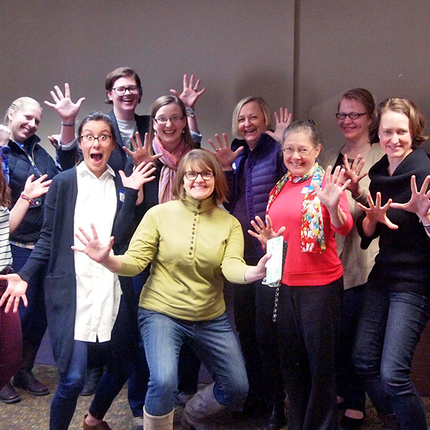Imagine you feel strongly about an issue, but don’t know how to take steps to get involved.
Or you want to run for a seat on a local committee that might benefit from your voice or input. You feel you lack the skills or, more often, confidence to run.
This is the reality for many women in rural areas. Opportunities for improvements in communities or on a council fail to attract us because maybe we haven’t been in the “traditional” workforce or haven’t worked “in town.” We even feel we wouldn’t be taken seriously.
“Those are the issues that likely need women’s involvement the most,” said Anna Johnson, Center for Rural Affairs policy program associate.
Here’s where the Women, Food & Agriculture Network (WFAN) comes in.
WFAN’s Plate to Politics workshop series empowers women to tell their own unique stories as a way to move people to action. The series helps women envision a variety of roles where they can have an impact within communities or organizations. Women can learn more about policymaking and receive advice about political life.
On March 18, 2017, Anna, Liz Johnson from VoteRunLead, and Liz Bennet, Iowa House 65th District Representative, presented at a Plate to Politics workshop hosted by WFAN attended by 15 women in Des Moines, Iowa.
Anna discussed her role at the Center - she works with beginning farmers on issues like conservation, land access, risk management tools, and farm policy. She also engages people in her work to advocate for policy change.
"The best part about these workshops is watching the attendees become empowered to take the next step to run for leadership positions in their communities,” said Ash Bruxvoort, WFAN Plate to Politics and communications director. “Women told us they are more likely to run after attending.”
Capacity building during the workshops is a key piece of the day and allows women to immediately apply takeaways into their next steps. The morning kicks off with a skill building exercise called Mining for Stories. The women break into small groups to practice storytelling and are provided feedback from other women in the group.
WFAN believes storytelling is a foundational tool for women to leverage.
A well-practiced “stump speech” is the number one tool candidates will use when announcing their candidacy, raising money for their campaign and moving constituents to become supporters. Women who want to advocate on a particular issue or support other female candidates also benefit from storytelling skills. The workshop provided an opportunity to practice and perfect their storytelling techniques. More about this can be found here.
Presentation tips are also given to participants, such as posture, speaking up, and how to handle emotion.
“Women are often told not to be emotional,” Anna said. “Emotion is a strength in telling your story to advocate for change. So, if your voice cracks, it’s fine. Don’t let it be a stumbling block.”
Often times women feel “too close” to an issue to get involved. That couldn’t be further from the truth. The power in those stories is what helps give us the unique perspective to be most effective on committees, boards, councils, and in elected office.
“We firmly believe providing leadership skills training to women in food, agriculture, and natural resources is key to changing the conversation about agriculture at all policy levels,” Bruxvoort said. “We are so excited to see what these women will do next.”
For more information about WFAN, visit their website.





